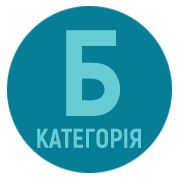DIRECTIONS OF DEVELOPMENT OF MEDIA LITERACY OF STUDENTS-READERS IN 7–9 CLASSES NUSH
DOI:
https://doi.org/10.32782/2307-1222.2024-57-36Keywords:
media education, media literacy, media competence, media text, visualization, critical thinking, student-reader, New Ukrainian schoolAbstract
The article discloses the main directions for the development of media literacy of students during the study of Ukrainian literature in the cycle of basic education in secondary school. It was found that the implementation of media education for the purpose of developing media literacy of students in Ukraine is facilitated by the activities of public organizations, state institutions and the support of foreign partners. An analysis of methodical materials and scientific works on the experience of introducing media literacy into the educational process, as well as a model curriculum on Ukrainian literature for grades 7-9, prepared at the Institute of Pedagogy of the NAPS of Ukraine, was carried out. The concepts of scientists regarding the areas of media literacy development are summarized. The types of educational activities in the process of studying Ukrainian literature with elements that contribute to the development of the skills of a competent reader and media user are substantiated. It was found that the formation of students' media competence skills takes place in primary school and continues during the adaptation cycle of basic education. Elementary media literacy skills, formed in the adaptation cycle of basic secondary education, are the basis for modeling various types of educational tasks on Ukrainian literature for grades 7-9. Taking this into account, correlations require directions for the formation of media literacy. It has been proven that the promising directions for the development of media literacy of students-readers of grades 7-9 in the process of their literary education are orientation in information sources, the ability to use them in compliance with the rules of academic integrity; meaningful perception of media texts in relationships with artistic texts; development of critical thinking, the ability express one's own opinion about what has been read using the latest media; development of media creativity based on read works of art; visual literacy and the culture of perceiving works through audiovisual media; mastering the basics of working with online tools.
References
Волошенюк О., Іванюк І., Кущ О., Шевченко Г. Авторські заняття від медіапедагогів-лідерів: медіаосвітні практики в позакласній роботі учнів 5–7 класів / за ред. В. Іванова, О. Волошенюк. Київ : ЦВП, АУП, 2017. 50 с.
Медіаосвіта та медіаграмотність : підручник / ред.-упор. В.Ф. Іванов, О.В. Волошенюк ; за наук. ред. В.В. Різуна. Київ : Центр вільної преси, 2012. 352 с. URL: http://www.aup.com.ua/uploads/momg.pdf.
Яценко Т. О., Пахаренко В.І., Слижук О.А., Тригуб І.А. Модельна навчальна програма «Українська література. 7–9 класи» для закладів загальної середньої освіти. Київ, 2023. URL: https://mon.gov.ua/storage/app/media/zagalna%20serednya/Navchalni.prohramy/2023/Model.navch.prohr.5-9.klas/Movno-literat.osv.hal/Ukrayinska.literatura.7-9-kl.Yatsenko.ta.in.26.07.2023-1.pdf.
Петрик Л.П. Медіаграмотність як навичка ХХІ ст. Педагогічна освіта: теорія і практика. Психологія. Педагогіка. 2017. № 27. С. 100–104. URL: http://pedosvita.kubg.edu.ua/index.php/journal/article/download/155/21.
Слижук О.А. Інтеграція інфомедійної грамотності у процес навчання української літератури в 5–6 класах Нової української школи. Вісник Луганського національного університету імені Тараса Шевченка. Педагогічні науки. 2022. № 1(349). С. 193–202. URL: http://doi:10.12958/2227-2844-2022-1(349)-1-193-202.
Тулодзєцький Ґ., Герціґ Б., Ґрафе С. Медіаосвіта в школі та на уроці: Основи і приклади / за заг. ред. В.Ф. Іванова ; пер. з нім. В. Климченка. Київ : Академія української преси, Центр вільної преси, 2020. 405 с.
Яценко Т. Тенденції розвитку методики навчання української літератури в загальноосвітніх навчальних закладах (друга половина ХХ – початок ХХІ століття) : монографія. Київ : Педагогічна думка, 2016. 360 с.










